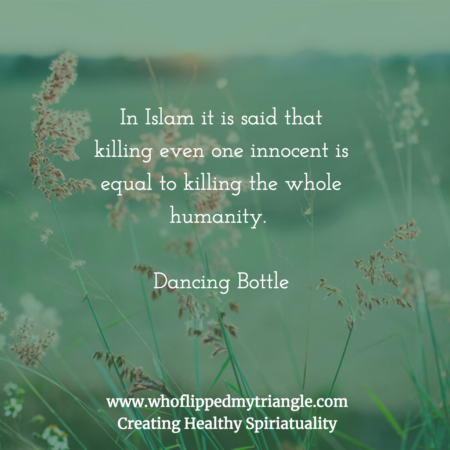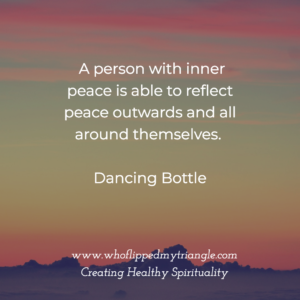If someone wants to know me: I can provide my name, my father’s name, my family name, and where I am from. This might seem sufficient for my identity, but it isn’t. These are just the basic layers of my identity! Should I also include my neighborhood, city, province, nation, religion, gender, sexual orientation, race, ethnicity, size, age, or any other detail?
If you delve into genetics and science, you begin to understand that we are all composed of the same fundamental substances—a blend of all the aforementioned characteristics. So, let’s ponder: what are my issues and where do they originate?
What has become of the human beneath all these layers? Well, we’ve become embroiled in an identity crisis. The undeniable truth is that we are all mortal. We require oxygen to breathe and food to sustain us. We are born, we live, and we die. Some suffer from events that similarly affect many of us, impacting others in comparable ways. All of us need love, compassion, forgiveness, and self-sacrifice—as individuals and collectively for all humanity.
Do we behave like turtles, retreating into our shells as if safeguarding Mother Earth from myriad threats? Consider how we collectively and individually react to every social and spiritual transgression committed against us. Are these offenses perpetrated by our fellow human beings? If we were to strip away all man-made political borders and shed all political and sexual identities, we would find a physical world inhabited by genuine human beings capable of uniting.
All political boundaries were and continue to be created in the name of peace. After millions of years of evolution, have these divisions truly brought about the elusive peace? No, they have not. Despite our evolution, our animal instincts remain intact within us. Today’s supposedly evolved human is far more perilous than its predecessors, thus political divisions based on identity can prove fatal for humanity. We may rescue other species from extinction, but through our actions, we are hastening our own demise.
To rid oneself of prejudices, racism, and discrimination, one must shed all societal identities, a task achievable only through universal education. It must be mutual; change must come from both sides—individually and collectively. I say “sides” because it remains an ongoing debate: which holds greater importance, the individual or the collective? When you bring politics into the equation and attempt to sway the masses or your chosen group, many within your group will inevitably reject your ideas. It’s challenging to veer from established societal norms and ideologies. If a society fails to uphold equal human rights, it opens itself to a host of crimes, including spiritual offenses, which ultimately plague the entire group.
The dilemma lies in our reluctance as groups to prevent such crimes, fearing it could spell political suicide. As individuals, we are loath to relinquish the sense of belonging politics affords us. For millennia, we’ve been conditioned to think this way, so transitioning to the next stage of evolution—transforming our security and current belief systems—is an uphill struggle.
To grasp this concept, we must first examine ourselves as individuals. If I were to select a single human attribute and scrutinize its intricacies, would I choose to alter it? I say “known attributes” because our understanding of the human body is still evolving; we don’t possess all the answers. When you introspect, not only does your belief in God deepen, but so too does your respect for fellow individuals. All the known and unknown capabilities of an individual are squandered when one kills or is killed pursuing the politics of group affiliation.
Do we diet to the point of emaciation, sacrificing our health? Such behavior is lamentable, considering our mortality. Homicide and being killed for a cause are commonplace in many societies, all due to the politics of group affiliation we willingly adopt to fit in. Do I strive to impress others within my group to gain acceptance? Seeking admiration and acceptance is linked to our need to belong.
If your sense of belonging is distorted, you must awaken your sense of freedom to align it with your true self, enabling sound decision-making that values your life.
Disliking a slight weight gain while striving for health stems from the pursuit of freedom. Such actions, like starving oneself, are unwise and unhealthy for any functioning individual. Discarding a perfectly healthy body just to conform to group norms is a clear sign of individual weakness. Stand up to your human potential!
As Kabir, the ancient poet, said centuries ago, “The drop is in the ocean, everyone knows; but few know the ocean in the drop.”
Since you’re not merely a drop in the ocean, but the ocean in a drop, dig deep and uncover your God-given potential. Don’t let trends, friends, or the politics of belonging rob you of life’s gifts. After all, you are the subcontractor of the Almighty.
Looking at the societal melting pot, one realizes this transformation is already underway. People are discovering that their core values and God-given identity are simply human. Like a vibrant coral reef with myriad hues, humanity thrives and survives.
Human individuals possess two facets and must balance responsibility between the two. Both our spiritual and physical sides influence our conduct. The physical side craves security, understanding human mortality, while the spiritual side finds security within, connecting to the source.
Extremes are often visible due to our shared humanity. While we yearn for physical experiences, extremes lack spiritual essence in an evolving world. As unfinished beings, we cannot claim omniscience, despite vast knowledge. We continue learning daily, reacting for eons, always claiming complete understanding. This isn’t to belittle anyone, but to highlight our ongoing evolution as individuals.
God bestowed upon us free will, empowering us to make decisions. Some may believe otherwise, but even leaves sway according to God’s will. Look around—do we all move and live like marionettes? Raised in the same family, we grow up to be different, choosing distinct paths, values, thoughts, and levels of dedication in our personal and spiritual lives. Why such diversity? Did God intend for us to be identical? This isn’t to diminish anyone’s knowledge but to foster self-awareness.
If leaves can’t move on their own, how can we think someone can abort a child without God’s will?
We may elevate God, feeling so vulnerable we can’t breathe without oxygen. Yet God does as God wills. With free will, God deputized us as subcontractors—subcontractors to execute God’s work as we choose. Does this enhance your importance as an individual, fostering accountability for your actions?
It’s often said a drug lord aids their community to the point where residents feel obligated to support them, believing their purpose is to safeguard them. But if drugs, harmful to the innocent, are truly understood, would aiding a drug lord be morally right? No! This is a matter of belonging, depriving individuals of personal justice and denying free will. Such actions lead to personal ruin. A destroyed individual cannot serve as God’s subcontractor.
God grants us equal opportunity to be good or bad. Understanding our spiritual compass is vital at every level of humanity. Lacking personal justice, individuals follow and enforce their group’s rules, rituals, traditions, and customs. This subjugates them to the group, not to God. The more one preaches group politics, the less one’s personal value.
Know your worth. You are an ocean in a drop, not a drop in the ocean. Many groups restrict individual greatness, favoring the masses. Yet, the essence of every group is its individuals. Religious beliefs, socialism, and communism often succumb to the politics of belonging, sacrificing individual rights. While we’ve progressed from human sacrifice, when it comes to mass versus individual rights, religions tend to favor the masses.
Equal human rights are a new phenomenon, the most spiritual principle humanity can embrace. Many are indoctrinated to feel good through self-sacrifice, from sleep to starvation to self-harm, common in various religious practices. Yet, it’s universally acknowledged that an active individual contributing to humanity fulfills God’s work. Reciprocity is a part of the contract we all sign with the Contractor, giving and taking, not just giving. Even bees and ants serve their queen but require sustenance. Genetically superior, we understand we’re all queens, thus none should live as worker bees or warrior ants.
Individual security is paramount, evolving from home walls to community, national, and even nuclear barriers, enduring through the ages.
As we’ve placed our faith in the “Big Brother,” securing our homes and walls, we’ve earned some respect. Yet ultimate security remains elusive. We’ve accepted that crime, to some extent, is inevitable in civilized society. Perfection is unattainable; we sometimes sweep our flaws under the rug. We play the blame game, attributing our deeds to the Devil. But no one should hide behind the Devil. We must all assume responsibility, as subcontractors serving as the CEO of our lives, irrespective of our beliefs.
Educating our animal instincts for self-regulation is crucial for social harmony, far more than stringent laws. Fear may elicit compliance, but the inclination to stray lingers once the threat passes. Rehabilitation, not harsh penalties, is the solution.
We need justice and security because not everyone can self-regulate or respect others. As we continue to evolve, we recognize that crime-free societies remain a distant goal. If you seek safety behind walls, consider the cost—not just monetary, but the stress and health issues robbing your quality of life. Given our mortality, we cannot sacrifice our happiness and health. We must respect both our physical and spiritual sides, bestowed upon us by God. Some religions connect rituals with customs like animal sacrifice, but is this necessary in God’s name?
Personally, I believe that our life is a gift from God, meant to be enjoyed in return for reciprocation. This reciprocation is deeply connected to our spiritual side. If you fail to reciprocate, it implies that you take and take without giving in return. This alone is a disrespect to God. Even if you claim to have spiritually subdued your animalistic side and yet do not contribute to God’s work, it must be understood and accepted that this is not the answer. By doing so, you seek validation from those around you rather than fulfilling God’s directives. This stems from your need for acceptance within your group. You may assert inner peace by suppressing your inner animalistic tendencies, but you have not done justice to yourself by sacrificing your physical life for the approval of your group. This extreme action robs you of true inner peace. So, can you genuinely claim to have inner peace?
Seeking to please and impress your belonging group externally may provide some satisfaction, but it does not lead to the inner peace we strive to attain and maintain. Without inner peace, you may unwittingly go against God’s wisdom of reciprocation.
If you find inner peace within yourself, you can embody and achieve spiritual enlightenment. As a spiritual being, compassion, empathy, forgiveness, love, and sacrifice become your virtues. While the spiritual aspects of religions preach these virtues, the politics of belonging often strip individuals of these spiritual treasures.
These virtues are personal spiritual assets that come with the responsibilities of free will. With free will comes responsibility for your actions. You cannot simply hide behind the desires of your belonging group. Why do you think we all possess free will and a sense of freedom? If you choose to act solely for the sake of your group, it has nothing to do with spirituality; it becomes merely about politics, and you are the one accountable for your choice. Thinking that you are not a cog in a machine is incorrect. You may be a small part of a machine, or you may be The Machine itself.



